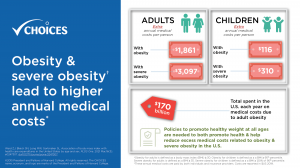A CHOICES study shows that excess body weight is associated with higher health care costs for people across a wide range of body-mass-index (BMI) levels in the U.S.
Ward ZJ, Bleich SN, Long MW, Gortmaker SL. Association of body mass index with health care expenditures in the United States by age and sex. PLoS ONE. 2021 Mar;16(3): e0247307. doi10.1371/journal.pone.0247307.
To address gaps in the literature, the study’s research team, led by Zach Ward, examined the association of weight with health care costs across the entire body mass index (BMI) distribution by age and sex.
The researchers used data for BMI-related health care costs from the Medical Expenditure Panel Survey (MEPS) 2011-2016 for 175,726 participants and adjusted total costs to $US 2019. To correct for self-report bias (which often leads to underestimates of obesity prevalence), the team also adjusted reported BMI data from the MEPS.
The team found that higher health care costs are associated with excess body weight across a broad range of ages and BMI levels, and were especially high for people with severe obesity. In general, the researchers found that among adults, obesity is associated with over $1,800 in extra annual medical costs per person, which accounts for over $170 billion of annual spending in the U.S. This figure rises to over $200 billion if excess costs from overweight (over $600 per person) are included. It was also found that, among children, obesity is associated with over $100 in extra annual medical costs per person, and over $1 billion of excess medical costs in the U.S.
These findings highlight the large economic impact of overweight and obesity in the U.S. and the importance of promoting healthy weight across all BMI levels. These data will provide policymakers and health care providers with better estimates of the health care cost impacts of excess weight.
“Although extra annual medical costs associated with children with obesity are a relatively small contributor to overall excess medical spending (less than 1% of all obesity-related medical expenditures), promoting healthy child weight may help to avert future health care costs, since excess body weight during childhood is a strong predictor of excess weight during adulthood.” – lead author, Zach Ward

